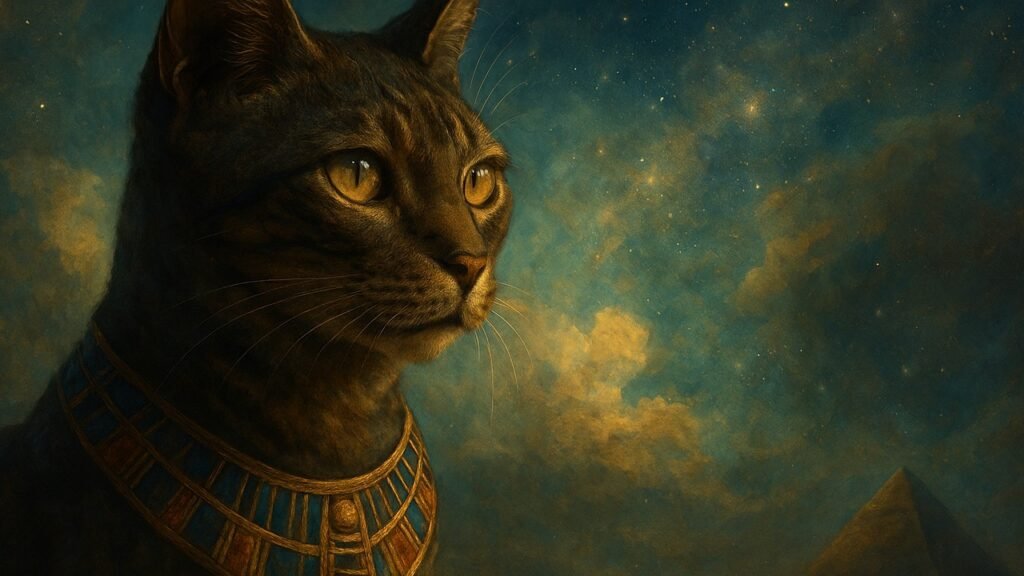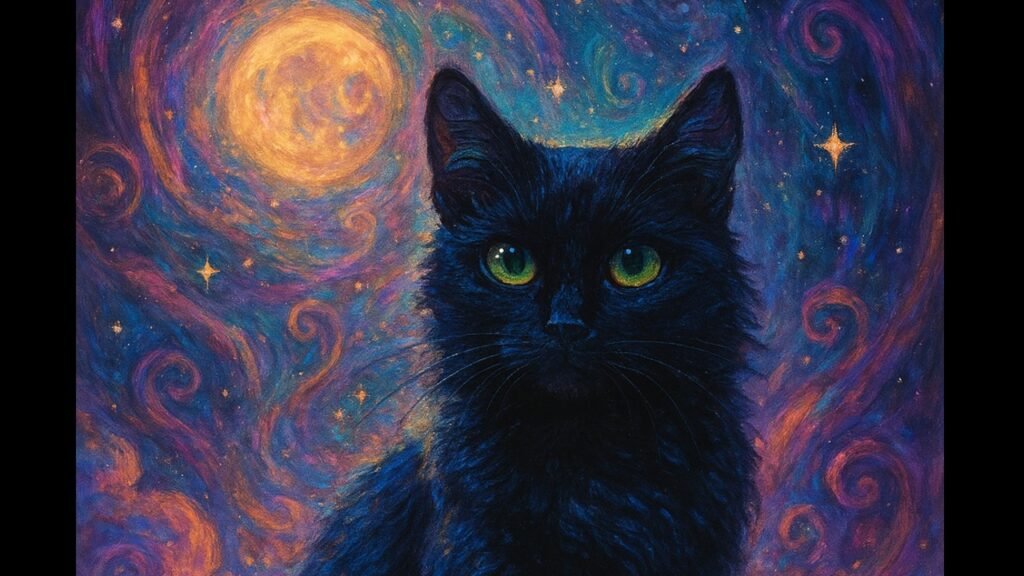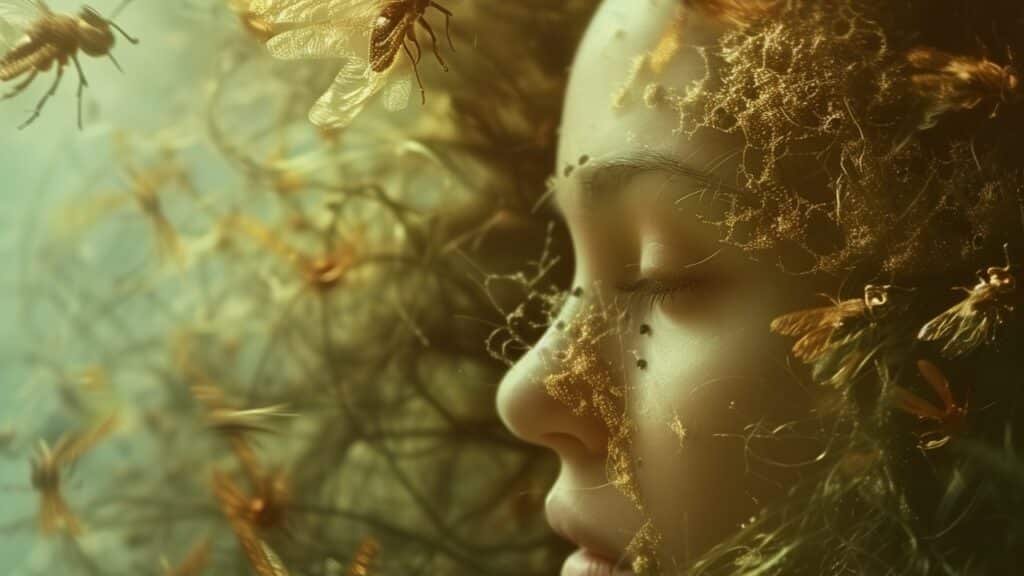A black cat in a dream often means mystery, and intuition, but its meaning shifts depending on many layers, namely, cultural context, emotional tone, your and symbolic nuance.
Ever wake up with the image of a black cat still clinging to your mind like static?
Not the Halloween cardboard cutout kind, I mean the real deal: sleek, silent, eyes like twin galaxies, perched somewhere impossible, perhaps chilling on a crescent moon or in your grandmother’s kitchen.
That’s the thing about black cats in dreams, they don’t just show up, they arrive. Like omens or even like riddles wrapped in velvet. Cute velvet of course.
Now, depending on who you ask (your aunt who swears by horoscopes, or that Jungian podcast guy with the gravelly voice), the black cat might mean mystery, feminine power, intuition, or, yeah… a warning.
Don’t fret, my dears, it’s not always doom and gloom.
Sometimes it’s just your subconscious tossing you a curveball, a cosmic wink, a reminder that not everything is what it seems.
Black cats have long walked the line between superstition and symbolism. That we can all agree on.
Dreaming of a black cat often stirs up mixed feelings, think superstition meets symbolism.
It’s your subconscious way of saying, trust the gut feeling you’ve been brushing off.
What Is the Spiritual Meaning of Seeing a Black Cat?
Spiritually, seeing a black cat, especially in a dream, is often a sign that something hidden is trying to surface, and so in dreams, they can appear as enigmatic messengers, giving us curiosity, fear, a humbled feeling, or fascination.
In many mystical traditions, black cats are seen as guardians of the unseen, protectors of thresholds, and companions to those who walk between worlds.
From a spiritual lens, a black cat in dreams often appears during times of transition. It signals intuition sharpening, energy shifting.
You might be waking up to subtle patterns or coincidences in your waking life, noticing synchronicities more than before.
In some traditions, a black cat walking toward you symbolizes good luck arriving; walking away can mean luck leaving but dreams personalize these old superstitions.
If a black cat appears in your dream and locks eyes with you, it might be a call to deepen your spiritual practice, listen to your inner voice, or prepare for a transformation that’s already underway.
Cultural Symbolism: Black Cat Dream Meaning
Culturally, black cats have carried very different meanings. In folklore, black cats are shape-shifters, not literally (though who knows), but symbolically. In ancient Egypt, they were sacred, protectors of the home and spirit.
In medieval Europe? Not so much. They got tangled up in witchcraft hysteria and bad luck superstitions.
Fast forward to now, and they’re Instagram mascots for goth girls and moon-phase meme accounts. But in dreams? They’re trickier.
In ancient Egypt, they were sacred protectors, often associated with Bastet, the goddess of home and fertility.
In European folklore, they were cast as companions of witches or omens of misfortune.
In Japanese tradition, though, a black cat can be a sign of prosperity and love, so depending on where your own beliefs lean, the symbol might flip: one dreamer sees warning, another sees blessing.
- Western folklore often links black cats to bad luck or witchcraft, especially when they appear suddenly or behave aggressively. In dreams, this might reflect anxiety, mistrust, or fear of the unknown.
- Ancient Egypt revered cats, (especially black ones) as sacred protectors. A dream rooted in this energy might signal spiritual guardianship or hidden power.
- Japanese and Celtic traditions sometimes view black cats as symbols of good fortune, especially when they show affection or cross your path gently.

Emotional Tone Matters
- A friendly black cat may suggest heightened intuition, emotional healing, or a protective force.
- An aggressive or frightening cat might point to unresolved fears, betrayal, or suppressed anger.
- A silent observer could symbolize a part of your psyche watching, waiting, or withholding judgment.
Black cats have appeared in dreams and myths for centuries.
In medieval Europe, they were feared as omens of plague or misfortune. In the 20th century, they became icons of rebellion and mystery, think noir films, Halloween imagery, and counterculture symbolism.
Today, they still carry that duality: feared by some and revered by many.
Why Black Cats Are Considered Evil: The Origins of Black Cat Superstition
In ancient civilizations like Egypt, black cats were revered. The goddess Bastet, protector of home and fertility, was often depicted as a lioness or domestic cat, and harming a cat (especially a black one) was considered sacrilege.
Cats were seen as guardians of the spirit world, and their mysterious nature was celebrated, not feared.
But by the 13th century, the tide turned.
In 1233, Pope Gregory IX issued a papal bull called Vox in Rama, which condemned black cats as part of satanic rituals. This decree helped fuel a wave of paranoia across Europe, where black cats became scapegoats in the Church’s campaign against heresy and witchcraft.
During the witch hunts of the 14th to 18th centuries, black cats were often accused of being witches’ familiars, supernatural companions that aided in spellcasting.
Their nocturnal habits, glowing eyes, and silent movements made them perfect targets for suspicion. In some cases, owning a black cat was enough to be accused of witchcraft.
By the time Halloween emerged as a cultural tradition, black cats had already been folded into the imagery of the occult.
Their association with witches, the night, and the supernatural made them a natural fit for the spooky season.
Despite their innocence, they became symbols of bad luck, especially in Western folklore.
Yet not all cultures adopted this view. In Japan, Scotland, and ancient Egypt, black cats were seen as bringers of good fortune, prosperity, and protection. The superstition is largely a Western construct, one that still lingers in pop culture and Halloween iconography today.
What Does the Black Cat Symbolize?
Symbolically, black cats carry a dual legacy, one of fear and fascination.
- Mystery and the Unknown: Their dark fur and nocturnal nature make them symbols of the hidden, the intuitive, and the mysterious.
- Independence and Rebellion: Black cats often represent autonomy and nonconformity. They walk their own path, which can mirror your own desire to break free from expectations.
- Protection and Magic: In many cultures, black cats are seen as magical protectors—able to ward off negative energy or signal spiritual shifts.
- Shadow Work: In Jungian terms, they may symbolize the Shadow—the parts of yourself you’ve ignored, denied, or buried. Their appearance could be an invitation to explore those depths.
Fear or fascination, black cats in dreams are rarely neutral. They’re symbolic catalysts, nudging you to look deeper, trust your instincts, and embrace the complexity of your inner world.
You would think the Lion and black cat dream symbols would be closely tied and to a point, both represent power and mystery but they diverge in tone: lions evoke conscious strength and leadership, while black cats suggest hidden intuition and the unknown.
Together, they reflect a balance between outer dominance and inner wisdom.
Jungian Interpretation: The Shadow and the Guide
Carl Jung believed that animals in dreams often represent instinctual parts of the psyche. A black cat, with its elusive nature and cultural baggage, may symbolize the Shadow, the hidden, repressed aspects of the self.
It might be inviting you to confront something you’ve avoided: a truth, a fear, or a part of yourself you’ve disowned.
But Jung also saw animals as guides. If the black cat in your dream feels calm, curious, or protective, it could represent your intuition, an inner knowing that’s trying to surface.
In this sense, the cat becomes a bridge between conscious awareness and unconscious insight.
Psychologically, dreaming of a black cat may mirror your relationship with the unknown parts of yourself, the aspects you keep hidden. Carl Jung might call it a visitation from your shadow self, an invitation to face what you’ve buried.
If the cat behaves playfully or calmly, it can mean you’re growing more comfortable with those darker or intuitive sides.
If it attacks, hides, or vanishes, it may reflect inner resistance or mistrust toward your own instincts.
Black Cat Dream FAQS
Black Cat Attacking or Biting You
A black cat attacking in a dream often represents mistrust or inner conflict. You might be ignoring an intuitive warning about someone or something in your life.
The aggression is symbolic, your subconscious fighting to get your attention. It’s not about danger, but awareness.
The message: stop brushing off that uneasy feeling you keep rationalizing away.
Black Cat Crossing Your Path in a Dream
When a black cat crosses your path in a dream, it often mirrors moments in life when you feel uncertain or cautious about moving forward.
Historically, this act was seen as a bad omen but in dreams, it’s usually about hesitation, not doom. It reflects a choice point: your instincts say “pause,” while logic says “go.”
The dream urges you to trust your intuition before taking your next step.
Multiple Black Cats in a Dream
Dreaming of several black cats can point to confusion or feeling overwhelmed by too many unknowns.
It might also suggest strong intuitive energy surrounding you, perhaps you’re absorbing emotions or energies from others. Spiritually, it’s a call to ground yourself and distinguish your own feelings from what you’re picking up around you.
Dead Black Cat in a Dream
Seeing a dead black cat in your dream might feel unsettling, but it often marks the end of superstition or fear.
You may be breaking free from self-limiting beliefs or reclaiming personal power that’s been buried under anxiety. Spiritually, it signals transformation — the death of irrational fear and the rebirth of clarity.
Dream Journaling Prompt
If a black cat shows up in your dream, don’t panic. Don’t look up “bad luck” and spiral.
Ask yourself: What’s shifting? What’s hiding? What’s waiting to be seen? The cat might be pointing to something you already know but haven’t admitted. Or it might just be reminding you that you’re more intuitive than you give yourself credit for.
“Describe the black cat’s behavior, setting, and your emotional response. What part of you might it represent? What is it guarding, or hiding?”




